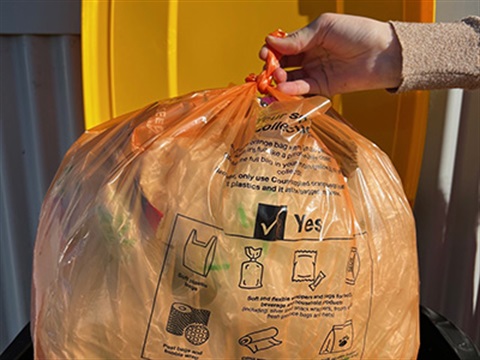Shire-wide soft plastic recycling pilot

Following a successful 12-month trial in Romsey in 2022, Council expanded its innovative soft plastic recycling collection pilot shire-wide in July 2024.
It is part of a national pilot program which subject to ACCC authorisation, will be managed by Soft Plastic Stewardship Australia, and has been established by the Australian Food and Grocery Council.
Background - Romsey Trial
Council launched an innovative kerbside soft plastic recycling collection trial in Romsey on 7 November 2022 to support the community to reduce waste and recycle more.
2,246 kerbside properties in Romsey were selected to recycle their soft plastic by collecting it separately in a Council-supplied orange collection bag and placing it in the recycling bin (yellow lid) on collection day.
Residents and businesses received an information pack which included a letter and 10 orange collection bags to use during the trial period.
Soft plastic collected in the trial is sent to a specialist processor in Victoria to make new plastic products locally, creating a circular economy.
The 12-month pilot was part of a national trial for a stewardship program which was established by the Australian Food and Grocery Council, funded by supporting brands and the Australian Government.
Due to the trial's success we are able to extend this program to the whole shire.
Who can participate?
Residents and businesses who use Council’s kerbside collection service can recycle their soft plastic by collecting it in the Council-supplied orange collection bag and, when full like a basketball, place it in their recycling bin (yellow lid).
Residents and businesses not on Council's kerbside collection service can recycle their soft plastic at their nearest resource recovery facility.
How do I participate?
Registration process
As this is a national pilot, residents will be required to register by completing a short survey prior to receiving their orange collection bags.
Residents who have a smart phone
Visit any of the following locations, scan a QR code to register and collect your pack, which includes a letter and 20 collection bags, from:
Residents who don't have a smart phone
You can collect your pack, and register at Customer service centres
How to recycle your soft plastics
Step 1: Fill the orange bag with your soft plastic packaging and when it’s full like a basketball, tie it securely closed.
Step 2: When full, put the bag in your recycling bin (yellow lid).
Remember, only use Council-supplied orange bags for the soft plastic, it must be bagged, not loose.
If you run out of bags, refer to the section below titled "Need more orange bags".
What can and can’t go in the orange bag?
Accepted items
Soft plastic packaging such as:
- biscuit wrappers (not trays)
- bread bags
- bubble wrap
- cereal packets
- chip packets and other silver-lined snack wrappers
- chocolate and other confectionary wrappers/bags
- citrus netting bags (metal clips removed)
- cling wrap/plastic film
- condiment sachets
- document sleeves, plastic mail satchels and carrier bags (labels removed if possible)
- fresh and frozen food bags
- ice-cream and icy pole wrappers
- mesh onion bags (metal clips removed)
- muesli bar wrappers
- newspaper/magazine wrap
- pasta, noodle and rice bags/packets
- pet food bags
- plastic bags
- potting mix bags (clean)
- produce bags
- six-pack ring (soft flexible plastic)
- snap lock/zip lock bags
- squeeze pouches (hard plastic lid and spout removed and clean)
- vacuum seal bags
- wine/water bladders (hard plastic spout removed)
- soft plastic labelled HDPE, LDPE or PP
- soft plastic numbers 2, 4 and 5
- any plastic that is soft and 'scrunchable', it should collapse easily in the palm of your hand and not bounce back to its original shape
All soft plastic items accepted in the REDcycle service, bearing the REDcycle logo or the Australasian Recycling Label (ARL) – Return to Store/Store drop-off symbol, can go into the orange bag.
Unaccepted items
Do not include:
- balloons
- biodegradable/degradable plastic
- biscuit trays
- blister packs
- bottles/cans
- bottle tops
- bread tags
- cellophane
- clothing/linen
- compostable plastic
- desiccant sachets/moisture absorbers
- elastic bands
- face masks
- fruit/berry punnets
- food waste
- fruit stickers
- hard/rigid plastic
- laminated paper
- meat trays (foam and plastic)
- paper and cardboard
- plant-based plastic
- plastic bags with cloth, rope or ribbon handles
- plastic containers
- plastic-lined paper
- plastic packaging tape
- plastic rope/twine
- plastic straws
- plastic takeaway containers
- polystyrene
- rubber/latex gloves
- silicone food storage bags
- single portion rigid sauce packet
- sticky adhesive tape
- toothpaste tubes
- tea and coffee bags
- soft plastic labelled PET, PVC, PS or nylon
Need more orange bags?
We're estimating that it will take a four-person household around one month to fill their collection bag (remember it needs to be full like a basketball). Twenty collection bags should be enough for close to a year, so please ensure you fill them up as much as possible before placing them in your recycling bin.
If you run out of orange bags, you can collect more for free — you just need to repeat the registration step detailed in the 'How do I participate?' section above.
Alternatively, you can continue to take large and excess soft plastic to a local resource recovery facility for free.
What happens to the collected soft plastic?
The soft plastic collected in the pilot program is sent to specialist processors in Victoria to make new plastic products locally, which supports our objectives to reduce waste to landfill, emissions and litter.
Read more about the scheme managed by Soft Plastic Stewardship Australia.